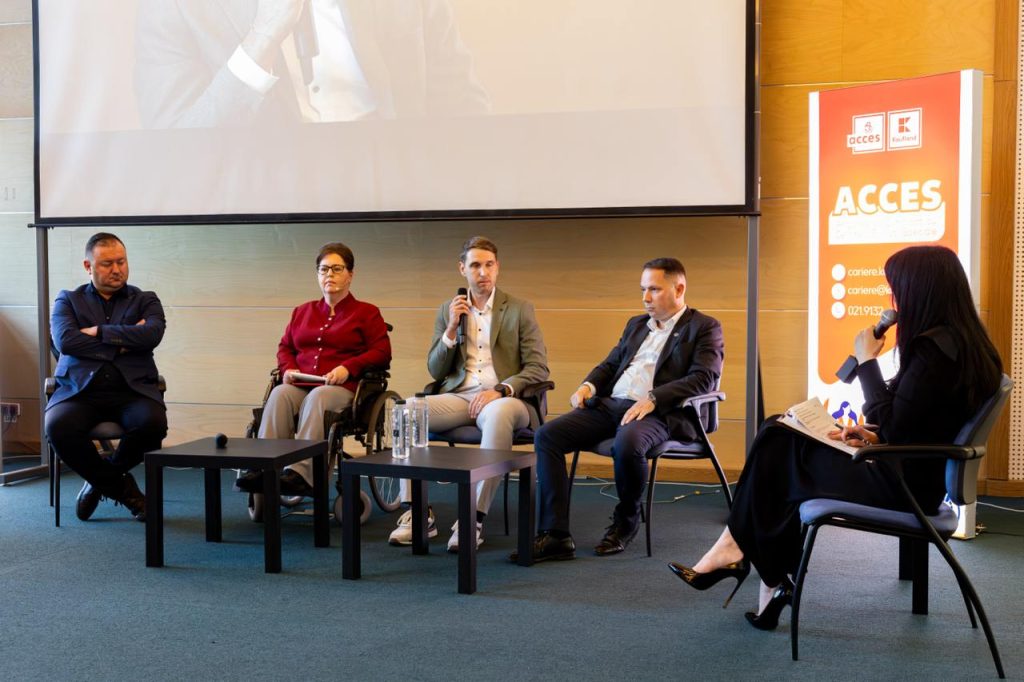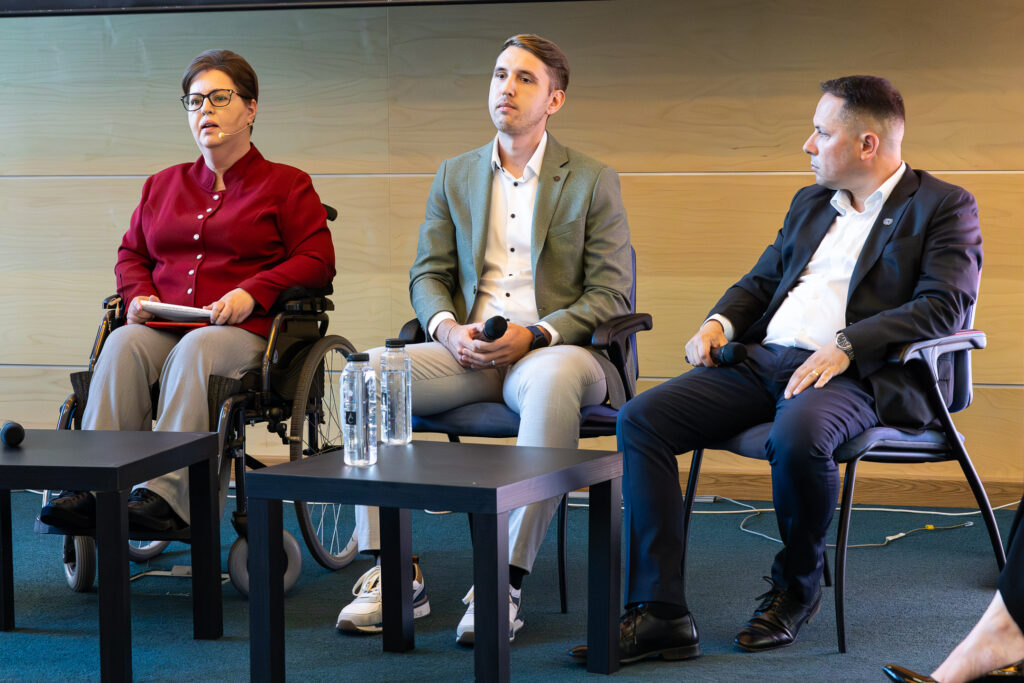“I liked the suggestion of adopting an NGO – it’s ideal,” said Daniela Tontsch President at Consiliul National al Dizabilitatii din Romania, during the fourth panel of the AccessABILITY Expo at the National Library in Bucharest. This event, part of the Romanian Accessibility Awareness Day (RAAD) 2024, opened a conversation on how businesses and individuals can actively contribute to disability inclusion by engaging with organizations that support people with disabilities.
Moderated by Andreea Groenendijk-Deveau, a London-based social entrepreneur and CEO of Renard Group, co-organiser of AccessABILITY Expo, the panel emphasised that inclusion is more than just a responsibility; it’s an opportunity for growth and mutual enrichment. Also featuring insights from Tudor Scripor, the Inventor of Tactile Standardisation for the Blind – Scripor Alphabet, Florin Cirnaru, the Co-manager of Atelierul de Panza which is part of Viitor Plus, a social enterprise that puts inclusivity and the environment at the heart of their activity, and Codrin Scutaru CEO and Founder of Public Affairs Solutions, the discussion explored the steps needed to improve accessibility in Romania.
Here are the key takeaways:
- Foster independence by engaging people with disabilities in real-world projects: Empowerment comes from active participation. Practical engagement in community and work projects can help individuals with disabilities build confidence and independence, helping to improve overall accessibility in Romania.
- Address infrastructure challenges to improve daily accessibility in Romania: Urban and rural areas alike need better infrastructure to allow people with disabilities to navigate their environments freely. Government and local authorities must prioritise accessible public spaces and transportation systems.

Codrin Scutaru, Daniela Tontsch, Florin Cirnaru, Tudor Scripor, and moderator Andreea Groenendijk-Deveau
Leverage technology and responsible corporate action: Companies should incorporate AI and other technologies to enhance accessibility in Romania. However, they must also ensure that their efforts are meaningful and focused on community benefit rather than PR.
Empowering Independence for Disabled People
Daniela highlighted the need to empower people with disabilities by fostering independence and breaking the cycle of over-protection from well-meaning parents. “Parents also need education. Many young people with disabilities need help to get out from under the ‘super-protection’ of parents who insist that ‘it’s too hard for you to work, to do this yourself,’” she explained. This overprotectiveness often prevents individuals from pursuing personal growth and career opportunities.
To tackle this issue, Daniela discussed plans to establish a training centre aimed at equipping young people with disabilities for independent living. Unlike traditional centres offering seminars, this initiative would focus on practical involvement by providing individuals with real-life experiences that prepare them for autonomy.
She added:
Go see the activities of an NGO and get to know the beneficiaries and the people who work there because you will find that they are not just people who have needs, just needs, they are people who will enrich you. Extraordinary people with an extraordinary zest for life, with an extraordinary joy. It will motivate you to be motivated. I like to call it motivational therapy.
The Urgent Need for Infrastructure to Support Accessibility in Romania
The lack of proper infrastructure remains a key barrier to accessibility in Romania. Daniela stressed that before focusing on technology and workplace accommodations, there needs to be a serious effort to address physical barriers. “Before we talk about technologies that employers could adopt to help people with disabilities, it’s important to talk about the infrastructure needed for a disabled person to get out of the house, to get to work,” she noted.
This point was further illustrated by Daniela’s personal experience: “I have a wheelchair that I can’t use because the walkways are inclined, the curbs are over a foot tall, there are poles.” This daily struggle to navigate urban spaces is a clear indication that accessibility in Romania still lags behind other European nations. Furthermore, the challenges extend beyond urban environments. Florin pointed out that the situation is even worse in rural areas, where basic infrastructure for people with disabilities is non-existent.
Moreover, Daniela highlighted the difficulty in obtaining essential equipment like wheelchairs and prosthetics. “In Romania, it’s a struggle to get a wheelchair reimbursed, and even then, it doesn’t cover the full amount.” This shortfall in financial support only worsens the challenges for those relying on this equipment to achieve independence.
Technology and Corporate Responsibility: Keys to Accessibility in Romania
Tudor spoke about the powerful role technology can play in improving accessibility in Romania, especially through innovations like artificial intelligence (AI). However, Tudor argued that accessibility must not be viewed as a simple corporate social responsibility (CSR) task. “Accessibility is not CSR. It is wrong to be sent to the CSR department when you want to implement accessibility,” he stated, emphasising that companies must incorporate accessibility into their core business strategies rather than treating it as an afterthought.
Tudor shared a success story of how AI can be used to help visually impaired individuals access information more easily. He spoke about his AI-driven educational platform designed for the visually impaired, which answers questions they might feel embarrassed to ask. For example, a 35-year-old man once asked him, “What is the colour of a pig?” Tudor explained that AI can provide individuals with the confidence and tools they need to ask such questions, ultimately promoting independence.
Technology is a friend, it’s a choice; technology can do us harm or it can do us a lot of good, it’s up to us, it’s the same as when we have free will.
Corporate social responsibility was also a key focus of the panel, particularly how companies should balance genuine community investment with PR efforts. Florin emphasised the importance of responsible corporate behaviour. “I know companies that invest more in communication than in benefiting the community. It is again about education, and every company needs to understand that good is done quietly,” Florin said. His message was clear: companies should focus on making real contributions to improving accessibility in Romania, not just boosting their image.
Cultural and Educational Shifts Needed for Lasting Change
Codrin took a broader view of the issues, highlighting that the cultural and educational barriers are deeply rooted in Romania’s history. “We have a resource that is practically unused, not just unused, marginalised. It is a cultural problem, a legacy of sad policies from the communist period,” he remarked. Codrin explained that the current societal mindset continues to marginalise people with disabilities, and there is an urgent need for Romania to align with European standards when it comes to accessibility.
According to Codrin, lasting change requires a multi-stage approach that begins with awareness and education. “Today a disabled person can only participate in society in a restricted way because society marginalises them,” he said. By building a culture that values inclusion, Romania can take meaningful steps toward creating a society where accessibility is the norm, not the exception.

